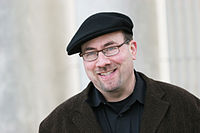Recently, the folks at the Harvard Berkman Center and the MIT Media Lab had a really good conference and hackathon addressing Truthiness in Digital Media. That’s in the Stephen Colbert sense, where people make up stuff which they want to be true. A lot of good progress was reported, particularly involving citizens and professionals working together to do serious factchecking.
Personal bias: I was very much the outsider there, not in the news business or anything related to it. While I’m not going to tell anyone how to do their job, I feel the country needs the news media to restore trust in their reporting, in large part, by doing lots of factchecking again. That bias, and my limited reporting skills, means that I’m not doing justice in this post to any of the good work discussed at this conference.
There are plenty of good factchecking efforts in progress. However, I figure that we need to address what Jon Stewart calls the “CNN leaves it there” problem. That’s where a reporter sees that a public figure is lying, but doesn’t factcheck the speaker, saying that they have to “leave it there”… and then repeating the lie, reinforcing it.
To be clear, we’re talking about lying in the black and white sense, not addressing half truths or spin. There’s plenty of that around.
At the MIT Media Lab, I worked with a number of humans, all much smarter than me, on what I feel is the big, unaddressed problem regarding factchecking. Factchecking alone, is like a tree falling in the forest, where no one hears it or cares about it. Factchecking efforts only have value, it’s felt, if:
- Misinformation is corrected, in a way that doesn’t reinforce the lie
- Any involved news outlets are encouraged to avoid promoting misinformation.
- Regular people, the broad citizenry, have the means to easily help media correct misinformation and encourage news outlets to restore factchecking.
The hackathon group I was part of tried to address this, and while factchecking is hard, this is much more so.
There are specific efforts, most notable of which is FlackCheck.org, from the folks who bring you FactCheck.org. Their deal is that if a SuperPAC runs a TV ad which is clearly deceptive, they encourage citizens to report that to the TV station running the ad. People would ask the station to pull the ad, citing the proof of deception, and reminding station people that it doesn’t serve the public interest to promote a lie.
There are other efforts which make such a call to action, though there’s at least one major effort, not announced yet. Current trustworthy, really good efforts include, in no particular order:
- Politifact
- CREW – Citizens for Responsibility and Ethics in Washington
- Sunlight Foundation network
- Snopes
- Source Watch/PR Watch
So, our team efforts focused on calling for more factchecking call to action projects, but then, finding a way to consolidate them, simply, so that anyone can find the effort that best suits them. More specifically, we’re looking for simple, direct, calls to action. The FlackCheck.org model is a good example of that, particularly since every call to a local TV station can help make a difference.
We need some way to glue together these efforts, emphasizing their independence and trustworthiness, something simple. In my personal experience, that helps attract an audience of millions.
Perhaps that consists of a single web page, listing those calls to action. We might find a way to really get people’s attention, with names like “Mob Justice with FactChecking” or, stealing from another team, “Lies with Friends.”
That also means individual action, from people who’d share calls to action with their own social networks, via email, Facebook, Twitter, Google Plus and whatever works.
It means that whenever a factchecking system finds a significant misstatement, emails and social media based calls to action could be programmatically generated.
In addition, we’d like to draw attention to such an effort with targeted ads, in Facebook, Google, and elsewhere. The deal is find people where they spend time, while trying to avoid preaching to the converted.
This could easily include a Google search of trusted factchecking sites, given judicious use of the “site:” search clause.
A lot of other ideas were suggested toward this end, and here’s two:
- social capital exchange as ways for committed participants to engage others
- browser extensions which, when on news sites, draw attention to misinformation like Truth Goggles.
Frankly, I was overwhelmed by the quantity of good, concrete suggestions, this is my best effort to boil it all down and make sense of it.
More to come…

